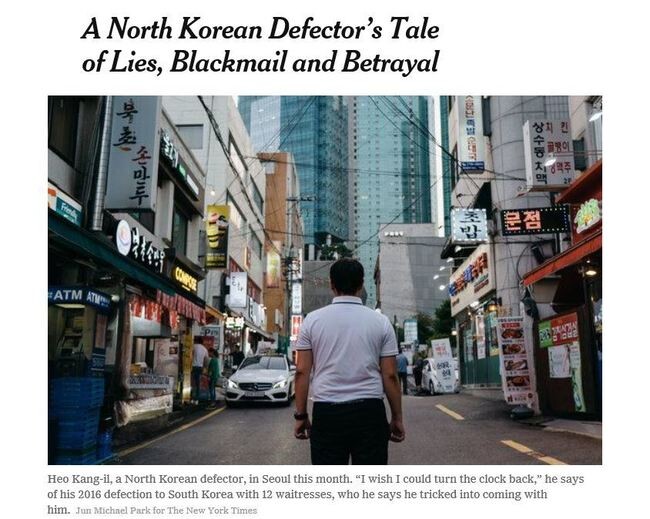hankyoreh
Links to other country sites 다른 나라 사이트 링크
Manager of Ryugyong restaurant relates details of his defection to New York Times

Heo Kang-il, the former manager of the North Korean Ryugyong restaurant in Ningbo, a city in China's Zhejiang Province, who organized a group defection by waitresses from that restaurant, told the New York Times about how and why he came to South Korea. Heo’s interview has appeared in one of the US’s leading newspapers at a time when the group defection has become a sensitive issue for inter-Korean relations.
In an interview in the New York Times on Aug. 4, Heo once again related the details of this incident, which occurred shortly before South Korea’s parliamentary elections in Apr. 2016. Heo said the reason he decided to defect was that a Korean-Chinese individual who was a regular customer at the restaurant threatened to report Heo to the North Korean authorities for regularly meeting figures from a South Korean intelligence agency (presumed to be the National Intelligence Service). That was when Heo asked South Korean intelligence agents to bring him to South Korea, he explained.
According to Heo, the South Korean agent contacted him on Apr. 3 and asked him to defect with all 19 waitresses within 48 hours. When Heo refused to do so, the agent reportedly threatened to inform the North Koreans about his attempt to defect while promising to pay him millions of dollars if he brought back the other defectors.
In the end, Heo said, he purchased 20 plane tickets bound for Kuala Lumpur, Malaysia, and then on Apr. 5 told the waitresses that they were relocating without telling them their real destination. Shortly before the group left the restaurant to head to the airport, five employees noticed that something was amiss and made their escape. The Chinese owner of the Ryugyong restaurant gave chase in his car and rammed one of the taxis carrying two waitresses, Heo said, and the group went on without them.
When the waitresses finally figured out where they were headed upon their arrival at the South Korean embassy to Malaysia, Heo said he persuaded them to continue on to South Korea by telling them they would be killed if they went back to North Korea. In the end, Heo and the twelve waitresses arrived in South Korea on the morning of Apr. 7.
Right before boarding the plane for Kuala Lumpur, Heo called a South Korean intelligence official. “I could hear hurrahs and applause erupting on the other end [. . .] They called me a hero,” Heo said.
But Heo was not given the millions of dollars promised him by the South Korean intelligence agency, and he has held positions such as a convenience store clerk and a delivery truck driver. Heo had already told a similar story to other newspapers both in South Korea and elsewhere.
Others tell a different story about what motivated Heo and how the defection went down. For example, the Chinese restaurant owner told The Hankyoreh at the end of 2016 that Heo had defected because of gambling debt. Some of the five women who ran away after noticing something strange on the day of the defection said that the person who brought the vehicles to the restaurant was a team leader for South Korea’s National Intelligence Service during an interview with a Japanese broadcaster.
By Ock Kee-won, staff reporter
Please direct comments or questions to [english@hani.co.kr]

Editorial・opinion
![[Guest essay] The real reason Korea’s new right wants to dub Rhee a founding father [Guest essay] The real reason Korea’s new right wants to dub Rhee a founding father](https://flexible.img.hani.co.kr/flexible/normal/500/300/imgdb/original/2024/0423/8317138574257878.jpg) [Guest essay] The real reason Korea’s new right wants to dub Rhee a founding father
[Guest essay] The real reason Korea’s new right wants to dub Rhee a founding father![[Column] ‘Choson’: Is it time we start referring to N. Korea in its own terms? [Column] ‘Choson’: Is it time we start referring to N. Korea in its own terms?](https://flexible.img.hani.co.kr/flexible/normal/500/300/imgdb/original/2024/0423/3617138579390322.jpg) [Column] ‘Choson’: Is it time we start referring to N. Korea in its own terms?
[Column] ‘Choson’: Is it time we start referring to N. Korea in its own terms?- [Editorial] Japan’s rewriting of history with Korea has gone too far
- [Column] The president’s questionable capacity for dialogue
- [Column] Are chaebol firms just pizza pies for families to divvy up as they please?
- [Column] Has Korea, too, crossed the Rubicon on China?
- [Correspondent’s column] In Japan’s alliance with US, echoes of its past alliances with UK
- [Editorial] Does Yoon think the Korean public is wrong?
- [Editorial] As it bolsters its alliance with US, Japan must be accountable for past
- [Guest essay] Amending the Constitution is Yoon’s key to leaving office in public’s good graces
Most viewed articles
- 1[Column] ‘Choson’: Is it time we start referring to N. Korea in its own terms?
- 2Opposition calls Yoon’s chief of staff appointment a ‘slap in the face’
- 3[Guest essay] The real reason Korea’s new right wants to dub Rhee a founding father
- 4Senior doctors cut hours, prepare to resign as government refuses to scrap medical reform plan
- 5Why Korea shouldn’t welcome Japan’s newly beefed up defense cooperation with US
- 6New AI-based translation tools make their way into everyday life in Korea
- 7[Editorial] Japan’s rewriting of history with Korea has gone too far
- 8Terry Anderson, AP reporter who informed world of massacre in Gwangju, dies at 76
- 9[Column] Has Korea, too, crossed the Rubicon on China?
- 10[Column] The clock is ticking for Korea’s first lady